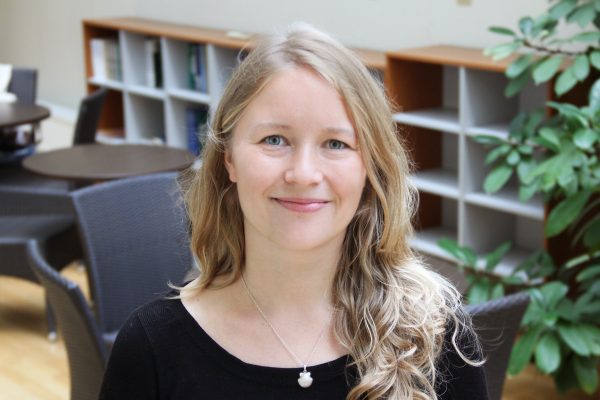
Lina Strupinskienė
Head of the Studies Department, Lecturer, IIRPS VU Alumni
What do you like the most about your job at the Institute? How did you become a part of the studies department?
I started working at the Institute while I was still studying, the Deputy Director at the time, Aušra Rauličkytė, noticed my work with the Students Representation and asked me to join. It’s been more than 10 years since I first started. The IIRPS became my home and I can’t imagine a place where I’d like to be more. I’m very happy to be a part of the Institute’s growth.
What were your studies like at the Institute?
It was hard at first, it seemed that everyone was smarter than me, more knowledgeable, had better grades in high school and that I got here by mistake. After celebrating the end of the first exam session, we got to talking with our coursemates and apparently that was more or less how everyone felt. After that it became much easier.
Do you face any problems at work? How do you deal with those challenges?
One step at a time 🙂
You also teach at the Institute. What are your fields of interest?
Even though I spend more time working as an administrator, I see myself more as a lecturer. Working with students gives me a lot of joy, advising them on their theses, discussions during seminars, holding lectures. I teach subjects connected to analysis of military conflicts and establishment of peace, but I also try to include some “theoretical knowledge”. I think it’s very important for students to understand different theoretical explanations, understand their premises and recognize them in real life cases. Behind every ordinary political commentary or a piece of news there are some premises. This is very important, because the outcomes and solutions heavily depend on these premises. I believe that this is one of the core skills in the modern world, that’s why I plan my lectures and practical assignments accordingly.
You spend a lot of time around the students of the Institute – what are they like?
It‘s very hard to say, because they‘re so different. If I had to single out a common feature, it would be a sincere wish to understand, what‘s going on in their own heads, the state, the world. Our students do that with serious passion. They might understand things differently, but then they end up finding friends with similar outlooks. I hope they can maintain these friendships long after graduating.
Tell us about your study experience abroad? Why‘d you choose to go abroad and how did you find the experience?
I was into military studies during my BA studies, it was always very interesting to me how people, who coexisted peacefully ended up being violent against each other. Maybe at the time it was out of some romantic thinking, I thought I would work at an international organization that would solve conflicts and only later I understood that I’m more interested in research, and that this knowledge might be helpful in creating better policies.
I went to Utrecht because it was one of the best institutions in military conflict studies. I never regretted anything, my studies were very interesting. Utrecht’s Center for Conflict Studies even reminded my of IIRPS because of its size, feeling of community, passionate lecturers, professionalism and the general atmosphere. The thing I liked the most was the opportunity to carry out field research in Bosnia and Herzegovina. Utrecht University has a long tradition of field research and they always try and make their students get a more “hands on” experience. It was surprising how easily they let students go to conflict zones and states that just lived through military conflict, although they make huge efforts to ensure student’s safety.
How did you get into transitional justice?
My Master thesis was about mass raping campaigns during war time in Bosnia and Herzegovina. I interviewed women who lived through this time and proffesionals who helped them. It left an unforgettable impression. I understood how important is to hear all the voices and to do whatever it takes to protect society from such experiences. After my studies I had an internship at the International Criminal Tribunal for the former Yugoslavia. It was a great opportunity to get more knowledge about post-conflict societies. It was not easy but at the same time very interesting. I had to read at least a thousand of pages of various documents in Bosnian, Serbian and Croatian languages. I learned a lot. In the Hague, lawyers, historians, political scientists, soldiers, even rocket scientists and SFX specialists worked with me as well. Majority of them were forced to flee from war and decided to sacrifice their careers for justice and brighter future of their country. They inspired me to focus on the transitional justice field.
How do you combine music and politics? How did music become a part of your life?
It is a sly question 🙂 My husband is a composer, he does movie soundtracks and plays in various music bands. I am a big fan of his, there’s always lots of music and musicians at our home.







